Highlights of the 3rd Conference on Dialogue Between Chinese and African Civilizations (1)
The 3rd Conference on Dialogue Between Chinese and African Civilizations was successfully held by China-Africa Institute (CAI) on April 9, 2024 in Beijing, under the theme “Inheritance, Sharing, Development: Toward a High-Level China-Africa Community with a Shared Future”.
The opening remarks were delivered by Gao Xiang, president of Chinese Academy of Social Sciences (CASS) and Chinese Academy of History (CAH); Sweta Chaman Saxena, Chief of Staff of United Nations Economic Commission for Africa; Liu Yuxi, Special Representative of the Chinese Government on African Affairs, and Rahamtalla M. Osman, Permanent Representative of the African Union to China. Wang Changlin, Vice President of CASS presided over the opening ceremony.
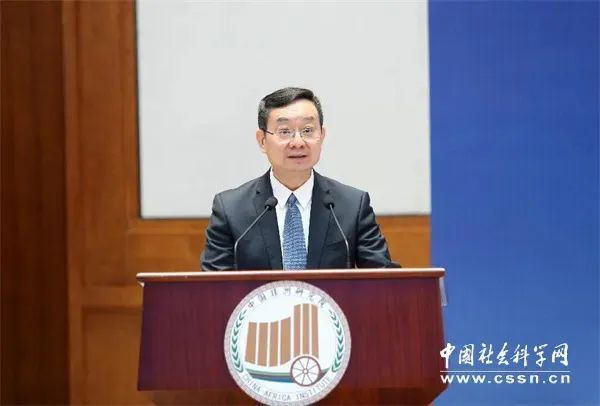
Gao Xiang is delivering speech (Chinese Social Sciences Net/Zhu Gaolei)

Wang Changlin is presiding over the opening ceremony (Chinese Social Sciences Net/Zhu Gaolei)
Gao Xiang said, President Xi Jinping proposed the Global Civilization Initiative (GCI) in March 2023, which provides Chinese wisdom and solutions to address global challenges and shows China's responsibility as a force for peace, stability and progress. China is the largest developing country, and Africa is the continent with the most developing countries in the world. China and Africa have been working together to promote the implementation of the GCI. This has injected new connotations into the long-standing China-Africa friendly cooperation.
Guided by the congratulatory letter from President Xi Jinping to the Inauguration of the CAI, and based on the academic platform and talent resources of the CASS, the CAI, a national-level think tank, has made great achievements in academic research, exchanges and communication as well as talent development, helped to promote the mutual learning between Chinese and African civilizations, Gao Xiang noted.
As a national platform for China-Africa people-to-people exchanges, the Conference on Dialogue Between Chinese and African Civilizations has become CAI’s brand project, highly praised by Africa academics. We hope that both Chinese and African scholars could pool their wisdom and put forward insightful views at the conference so as to jointly promote mutual learning between Chinese and African civilizations, strengthen China-Africa friendship and contribute to the building of a high-level China-Africa community with a shared future.

Liu Yuxi is delivering speech (Chinese Social Sciences Net/Zhu Gaolei)
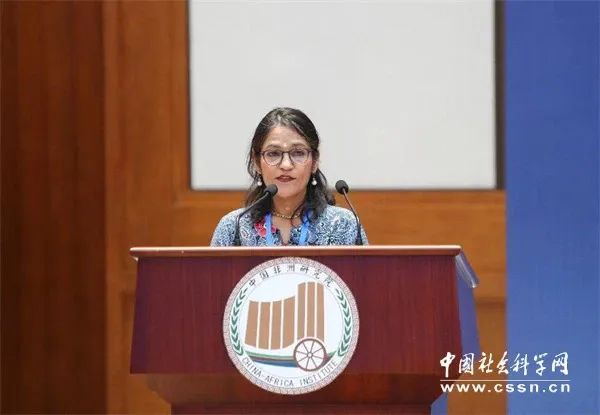
Sweta Chaman Saxena is delivering speech (Chinese Social Sciences Net/Zhu Gaolei)
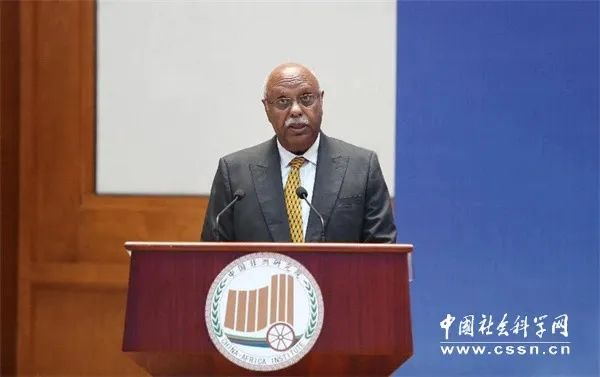
Rahamtalla M. Osman is delivering speech (Chinese Social Sciences Net/Zhu Gaolei)
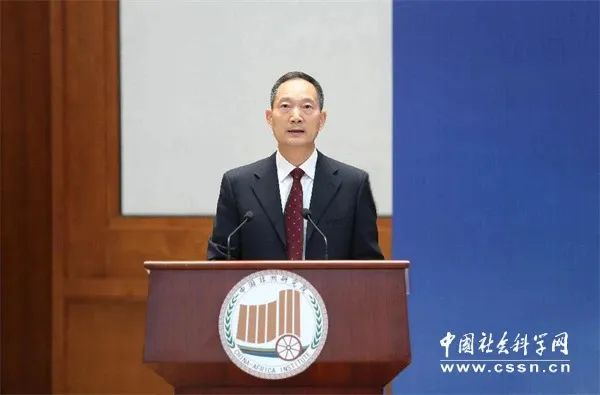
Li Xinfeng is making presentation (Chinese Social Sciences Net/Zhu Gaolei)
Liu Yuxi said, under the guidance of Chinese and African leaders, China-Africa unity has embarked on a even broader path to development with increasing people-to-people exchanges, acting as the pioneer for building a community with a shared future for mankind. A China-Africa high-level community with a shared future is based on equality, characterized by the principle of extensive consultation, joint contribution, and focuses on fairness and justice, openness and inclusiveness. The ninth FOCAC will be held later this year, and China is willing to work with Africa to take the forum as a new start and continue to deepen China-Africa relations, so as to inject stability and optimism for global peace and development.
Sweta Chaman Saxena said, President Xi Jinping announced the Global Development Initiative (GDI) which underlines the International consensus on putting development first, and the people around the world stay confident in realizing the United Nations Sustainable Development Goals 2030. The theme of this conference “Inheritance, Sharing, Development: Toward a High-Level China-Africa Community with a Shared Future” underscores the issues that are at the centre of sustainable development.
Indeed, eliminating poverty has always been an international goal for sustainable development. China has made major achievements in eliminating poverty and contributed greatly to global poverty alleviation. China’s experience offers valuable reference for Africa. Africa enjoys a long history, rich resources and talent resources. It needs to know about its cultural values, leaders and comparative advantage to achieve inclusive growth and eliminate poverty, he noted.
Rahamtalla M. Osman pointed out that cultural inheritance plays an important role in mutual learning between Chinese and African civilization. Firstly, both Africa and China enjoyed splendid civilization, which has paved the way for bilateral exchanges and high-level development. Secondly, Africa and China enjoyed a long history of friendly cooperation and people-to-people exchanges. The two sides should carry forward the tradition of communication and cooperation and bring more stability to future development.
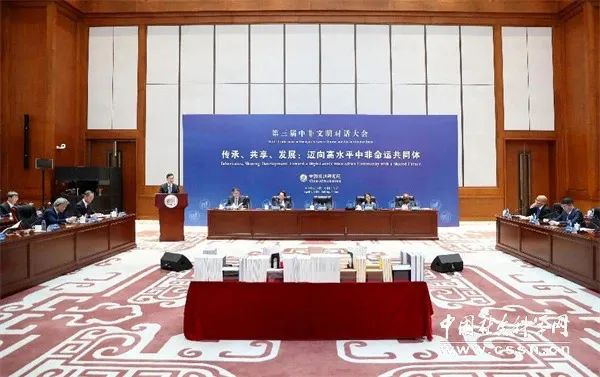
Participants at the conference (Chinese Social Sciences Net/Zhu Gaolei)
At the opening ceremony, Li Xinfeng made a presentation on the Five-Year achievement of the CAI. He said, the CAI has remained true to its original inspiration to promote China-Africa relations over the past five years. It has successfully launched academic exchange platforms, and dedicated to making breakthrough of producing more high-quality talent achievements through planning, organizing, and managing projects of individual and group researches on African studies as well as China-Africa partnership.
Soon after the CAI was established, the research team “Xi Jinping and Africa” was formed, specializing in academic research, policy interpretation and International communication on Xi Jinping Thought on Socialism with Chinese Characteristics for a New Era. The CAI has now finished compiling Selected Speeches and Writings of Xi Jinping on Africa, Series of China and Africa in the New Era (both Chinese and English versions), Research Reports on the Elimination of Poverty in China (both Chinese and English versions), and 100 Cases of Targeted Poverty Alleviation in China: Volumes I-III (Chinese, English and French versions).
The Research Reports on the Elimination of Poverty in China (English version) were collected by the Museum of the Communist Party of China (CPC) as the exhibits to celebrate the CPC’s centenary. The CAI by now has published 25 monographs, 19 translation books, 16 books of research paper series and 3 almanacs of African Studies in China, making positive contribution to the building of systems of discipline, academic researches, and discourse with Chinese characteristics.
The CAI has also built up its own database publishing academic achievements of the institute. At the present, the CAI is also conducting two major research projects. The first major research project is the newly compiled General History of Africa (Multi Volume), which is also one of the key projects funded by National Social Science Fund. The second major research project is Xi Jinping Thought on Culture and Building of Modern Chinese and African Civilizations, which is one of the major research projects to interpret Chinese modern civilization funded by the CASS. To mark the 5th anniversary of its establishment, the CAI has also launched its new official website accessible in both Chinese and English.

Zhang Yuyan is delivering speech
The keynote speeches session was moderated by Zhang Yuyan, member of CASS and Director-General of Institute of World Economics and Politics, CASS, and delivered by Li Xiangyang, Director and Research Fellow of National Institute of International Strategy, CASS; Paul Tembe, Founder and Director of SELE Encounters; Wu Guobao, Research Fellow of Rural Development Institute, CASS, and Hassan Ragab, Executive Director of Confucius Institute of Suez Canal University in Egypt.
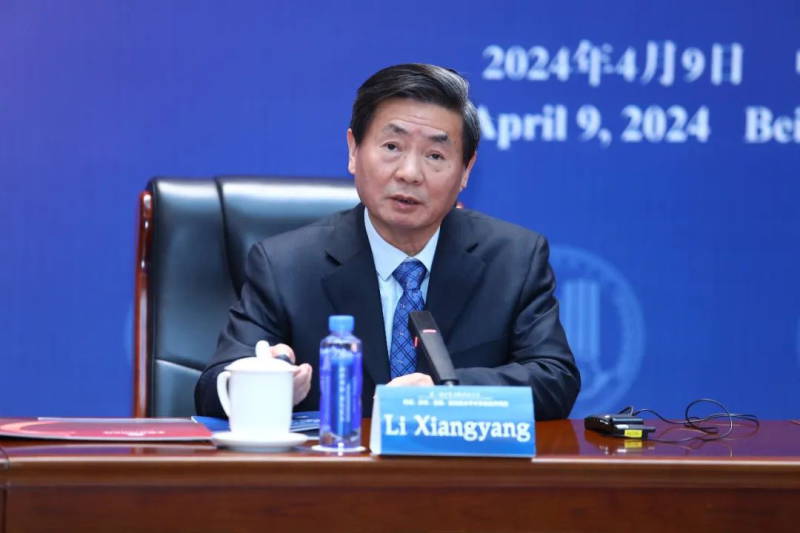
Li Xiangyang is delivering speech
Li Xiangyang said, the development orientation of the BRI determines that it does not set rules as a threshold during its initial stage, thus providing opportunities for developing countries to participate in international economic cooperation. It is not an alternative, but a synergy for the current global governance system, as the two both require detailed planning. The development orientation of the BRI is based on infrastructure connectivity, which helped to encourage investment from global powers to address the long-standing issue of inadequate provision of infrastructure in the international community. Unlike commercial cooperation or foreign aid, the diversified cooperation mode under the framework of BRI laid a foundation for underdeveloped member countries to develop new comparative advantages.
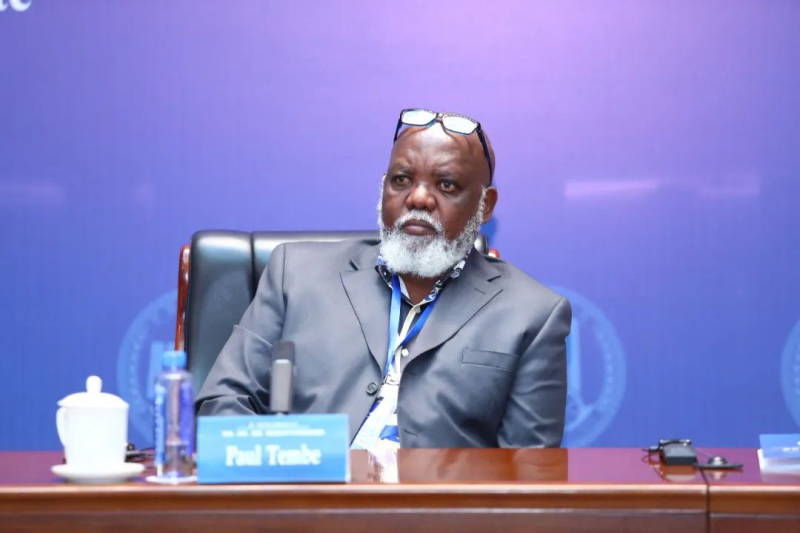
Paul Tembe is delivering speech
Paul Tembe noted that strategic communication, intercultural communication and communicate platform are important factors. Currently, with improving bilateral relations, China and South Africa should exchanges ideas and learn from each other in order to meet the needs of high-quality development in the new era. We should strengthen studies on Xi Jinping's Thought on Governance and theory studies and research on the principles of sincerity, real results, affinity and good faith. The BRI and other three global initiatives have injected confidence and impetus into global development, in which the inheritance and development of civilizations and cultures is an important focus for building harmonious and friendly relations. China and Africa should continue to carry out practical cooperation under the principles of sincerity, real results, affinity and good faith, with focus on the inheritance, sharing and development of civilization, for the building of a higher level China-Africa community with a shared future.
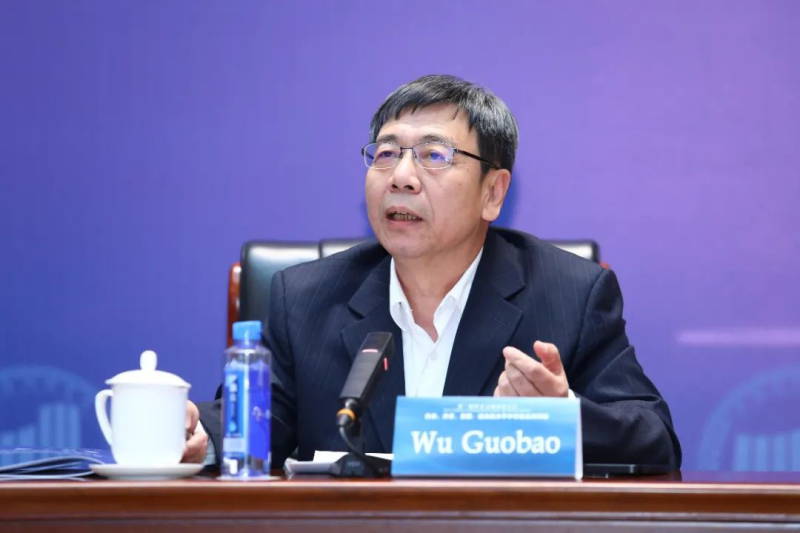
Wu Guobao is delivering speech
Wu Guobao said, China’s success in poverty alleviation is closely related to the time, and the political system and governance system with Chinese characteristics. There are many factors and experience that China could share with other countries, such as how to maintain social stability, how to encourage impoverish population with working abilities to be independent, and how to introduce targeted poverty alleviation. China’s experience offers valuable reference for African countries and other developing countries, contributing positively to global poverty alleviation.
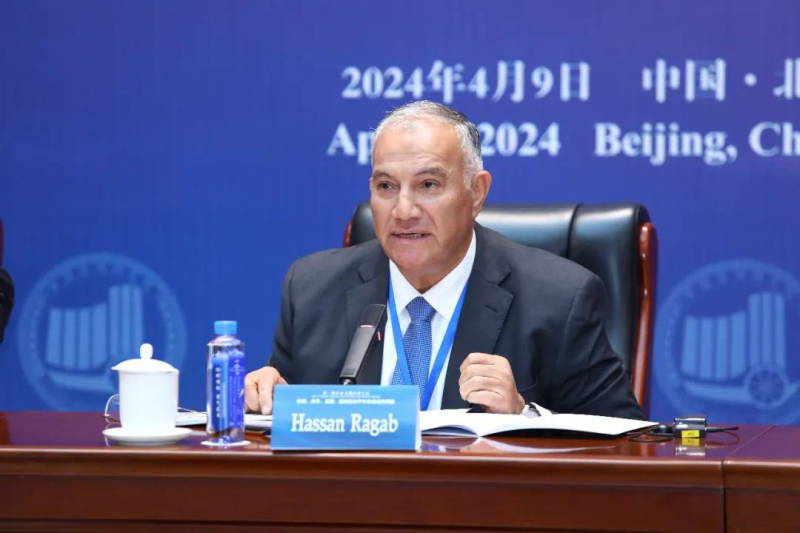
Hassan Ragab is delivering speech
Hassan Ragab said, under the framework of the BRI that was proposed one decade ago, China and Egypt have laid a solid foundation in political mutual trust, and reached a series of consensus on deepening cooperation through close high-profile visit and strategic dialogue. Chinese and Egypt economic structure is complementary, bringing advantages and potentials for cooperation between the two sides. China and Egypt have deepened cooperation in culture, education, technology, tourism and other areas. The two sides will continue to work together to improve International cooperation mechanisms, promote the reform of international order, safeguard the common interest of developing countries, and to create a new international platform for BRI cooperation.


